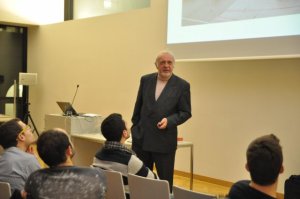Mag. Dr. Gerhard Stadler, Director emeritus of the European Organization for Safety of Air Navigation

From a historical perspective, globalization has always been linked to communication, finance and was based on available modes of transport and its infrastructure. Dr. Stadler introduced his talk at Lauder Business School by providing examples for early forms of globalization like the Hansa and colonial empires such as Spain, the United Kingdom and France. The framework necessary for globalization remained the same for centuries, if not millennia. The political agreement on free movement of people and goods, political stability, liberal market access and trade regimes, openness to foreign investment, convertible currency, communication in a “lingua franca”, a transport infrastructure and access to international modes of transport are the cornerstones of global economic interaction.
Aviation, as emphasized by Dr. Stadler, is one of the main critical success factors for globalization of the 21st century. The growth of aviation and all its related and supporting industries over four decades has been fueled by liberalization of market access, political integration, new and better information channels, booming economies and, last but not least, the best safety records of any mode of transportation. Since 2008, aviation is facing a negative, unstable development, because of the world economic crisis, epidemic diseases such as SARS, political instability (Arab Spring), and force majeure such as volcanic ash. Nevertheless, the industry expects an increase of approximately 6% p.a. in passenger travel and 2-3% p.a. in freight until 2017.
Dr. Stadler pointed out that even if the current and historical volumes of passenger transport exceed those of freight by far, cargo by plane is of crucial importance for the aviation industry as well as the global economy. Over the next fifteen years, annual growth of air cargo will outpace growth rate of pax figures. By comparing the cost per ton mile Dr. Stadler made clear that other criteria for transport of goods by air apply compared to maritime, rail or truck transport. A combination of short lead times, long distance, short innovation cycles, special transport needs, high value and low volume justifies transport by plane. After providing very valuable insight about the criteria for major cargo airports and the higher degree of differentiation of air cargo operators, an analysis of the opportunities and threats for aviation concluded Dr. Stadler’s speech.
Following a career in the civil service of Austria and a diplomatic assignment in Geneva, Dr. Stadler has specialized in aviation since 1990. He is a member of the board of various aviation companies in Austria, and Vice-President of the European Civil Aviation Conference (associated to ICAO). From 2000 to 2007 he was director of the intergovernmental organization Eurocontrol (European Organisation for the Safety of Air Navigation, Brussels). Since 2008 he has been working as a consultant in air transport and air navigation matters in Europe and Asia. Dr. Stadler is a faculty member of various universities for applied sciences in Germany and Austria, having written numerous publications on subjects of European law, aviation and tourism.


Recent Comments